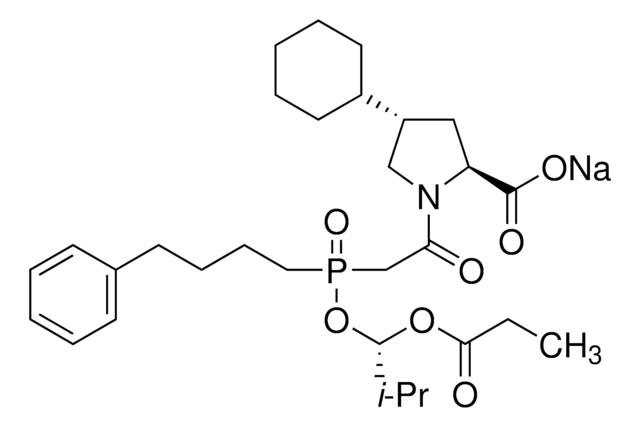F1308
Fosinopril sodium
≥98% (HPLC), powder
Synonym(s):
(2S,4S)-4-Cyclohexyl-1-(2-{[2-methyl-1-(propanoyloxy)propoxy](4-phenylbutyl)phosphoryl}acetyl)pyrrolidine-2-carboxylic acid, Acecor, Eosinopril, Fosinopril, Monopril, SQ 28555, Secorvas, Staril
About This Item
Recommended Products
Quality Level
Assay
≥98% (HPLC)
form
powder
storage condition
desiccated
color
white to off-white
solubility
H2O: >20 mg/mL
originator
Bristol-Myers Squibb
storage temp.
−20°C
SMILES string
O=C([O-])[C@H]1N(C(CP(CCCCC2=CC=CC=C2)(O[C@@H](C(C)C)OC(CC)=O)=O)=O)C[C@H](C3CCCCC3)C1.[Na+]
InChI
1S/C30H46NO7P.Na/c1-4-28(33)37-30(22(2)3)38-39(36,18-12-11-15-23-13-7-5-8-14-23)21-27(32)31-20-25(19-26(31)29(34)35)24-16-9-6-10-17-24;/h5,7-8,13-14,22,24-26,30H,4,6,9-12,15-21H2,1-3H3,(H,34,35);/q;+1/p-1/t25-,26+,30+,39?;/m1./s1
InChI key
TVTJZMHAIQQZTL-TXDYNIFHSA-M
Looking for similar products? Visit Product Comparison Guide
General description
Biochem/physiol Actions
Features and Benefits
Signal Word
Warning
Hazard Statements
Precautionary Statements
Hazard Classifications
Eye Irrit. 2 - Repr. 2
Storage Class Code
11 - Combustible Solids
WGK
WGK 3
Flash Point(F)
Not applicable
Flash Point(C)
Not applicable
Certificates of Analysis (COA)
Search for Certificates of Analysis (COA) by entering the products Lot/Batch Number. Lot and Batch Numbers can be found on a product’s label following the words ‘Lot’ or ‘Batch’.
Already Own This Product?
Find documentation for the products that you have recently purchased in the Document Library.
Our team of scientists has experience in all areas of research including Life Science, Material Science, Chemical Synthesis, Chromatography, Analytical and many others.
Contact Technical Service







